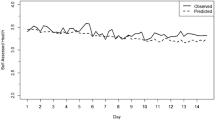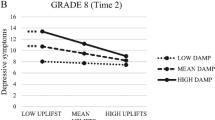Abstract
The relationship of perceived control over daily uplifts and hassles to depression and restraint was examined in a sample of 140 middle-class sixth graders. Results indicated that greater control over uplifts was associated with better functioning and lower control over hassles with poorer functioning, even after partialing out the respective number of uplifts and hassles reported. Moreover, when directly compared, control over uplifts showed more powerful associations with adaptational outcomes than did control over hassles. In a separate analysis, the number of uplifts over which children reported high control showed opposite relationships to adaptational outcomes than did the number of uplifts over which children reported low control. A different pattern appeared for hassles. Although the number of hassles with low control was associated with poorer functioning, the number of hassles over which children had high control was unrelated to adaptational outcomes. The possibility that control operates somewhat differently for positive and negative events is discussed.
Similar content being viewed by others

References
Bandura, A. (1986).Social Foundations of Thought and Action, Prentice Hall, Englewood Cliffs, NJ.
Baumrind, D. (1971). Current patterns of parental authority.Dev. Psychol. Monogr. 41: Part 2.
Baumrind, D. (1975).Early Socialization and the Discipline Controversy, General Learning Press, Morristown, NJ.
Bobo, J. K., Gilchrist, L. D., Elmer, J. F., Snow, W. H., and Schinke, S. P. (1986). Hassles, role strain, and peer relations in young adolescents.J. Early Adoles. 6: 339–352.
Coddington, R. D. (1972). The significance of life events as etiologic factors in the disease of children. II. A study of a normal population.J. Psychosom. Res. 16: 205–213.
Cohen, L. H., Burt, C. E., and Bjork, J. P. (1987). Life stress and adjustment: Effects of life events experienced by young adolescents and their parents.Dev. Psychol. 23: 583–592.
Compas, B. E. (1987). Coping with stress during childhood and adolescence.Psychol. Bull. 101: 393–403.
Compas, B. E., Davis, G. E., Forsythe, C. J., and Wagner, B. M. (1987). Assessment of major and daily stressful events during adolescence: The Adolescent Perceived Events Scale.J. Consult. Clin. Psychol. 55: 534–541.
Compas, B. E., Malcarne, V. L., and Fondacaro, K. M. (1988). Coping with stressful events in older children and young adolescents.J. Consult. Clin. Psychol. 56: 405–411.
Diener, E. (1984). Subjective well-being.Psychol. Bull. 95: 542–575.
Feldman, S. S., and Quatman, T. (1988). Teen timetable as described by 12 year old boys and their parents.J. Early Adoles. 8: 325–343.
Horner, M. S. (1970). Femininity and successful achievement. In Bardwick, J. M.,et al. (eds.),Feminine Personality and Conflict, Brooks/Cole, Monterey, CA, pp. 45–73.
Horner, M. S. (1971). The psychological significance of success in competitive achievement situations: A threat as well as a promise. In Day, H., Berlyne, D. E., and Hunt, D. E. (eds.).Intrinsic Motivation: A New Direction in Education, Holt, Canada.
Johnson, J. (1986).Life Events as Stressors in Childhood and Adolescence, Sage, Beverly Hills, CA.
Kanner, A. D., Kafry, D., and Pines, A. (1978). Conspicuous in its absence: The lack of positive conditions as a source of stress.J. Hum. Stress 4: 33–39.
Kanner, A. D., Coyne, J. C., Schaefer, C., and Lazarus, R. S. (1981). Comparison of two modes of stress management: Daily hassles vs. major life events.J. Behav. Med. 4: 1–39.
Kanner, A. D., Harrison, A., and Wertlieb, D. (1985). Development of the Children's Hassles and Uplifts Scales, Poster session presentation at the meeting of the American Psychological Association, Los Angeles, CA.
Kanner A. D., Feldman, S. S., Weinberger, D. A., and Ford, M. E. (1987). Uplifts, hassles, and adaptational outcomes in preadolescents.J. Early Adoles. 7: 371–394.
Kovacs, M. (1980). Rating scales to assess depression in school-aged children.Acta Paedo-psychiat. 46: 305–315.
Matheny, K. B., and Cupp, P. (1983). Control, desirability, and anticipation as moderating variables between life change and illness.J. Hum. Stress 9: 14–23.
Monroe, S. M. (1983). Major and minor life events as predictors of psychological distress: Further issues and findings.J. Behav. Med. 6: 189–205.
Reich, J., and Zautra, A. (1981). Life events and personal causation: Some relationships with satisfaction and distress.J. Person. Soc. Psychol. 41: 1002–1012.
Scarr, S., and McCartney, K. (1983). How people make their own environments: A theory of genotype-environment effects.Child Dev. 54: 425–435.
Seligman, M. E. P. (1975).Helplessness: On Depression, Development, and Death, W. H. Freeman, New York.
Siddique, C. M., and D'Arcy (1984). Adolescence, stress, and psychological well-being.J. Youth Adoles. 13: 459–473.
Skinner, E. A., Chapman, M., and Baltes, P. B. (1988). Control, means-end, and agency beliefs: A new conceptualization and its measurement during childhood.J. Person. Soc. Psychol. 54: 117–133.
Vinokur, A., and Caplan, R. D. (1986). Cognitive and affective components of life events: Their relations and effects on well-being.Am. J. Commun. Psychol. 14: 351–370.
Weinberger, D. A., Feldman, S. S., and Ford, M. E. (1990). Construct validation of the Weinberger Adjustment Inventory, Unpublished manuscript.
Author information
Authors and Affiliations
Additional information
This research was supported by a grant to the second author from the Stanford Center for the Study of Families, Children and Youth. The authors are grateful to Rachelle Hacket for data analysis, Tom Gehring for data collection, and Susan Nolen-Hoeksema for critical comments.
Rights and permissions
About this article
Cite this article
Kanner, A.D., Feldman, S.S. Control over uplifts and hassles and its relationship to adaptational outcomes. J Behav Med 14, 187–201 (1991). https://doi.org/10.1007/BF00846179
Accepted:
Issue Date:
DOI: https://doi.org/10.1007/BF00846179



